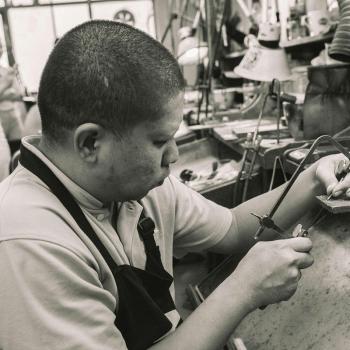What should you do when your coworker or loved one asks you to call them by a new name or gender? Is there a proper Christian response?

The sweet old lady whom I called Grandma had known me for over twenty years. Again, she called me by the wrong name, as she had done for decades. When I corrected her, she answered the same way she’d done every time: “My goodness, honey—I know your name is Greg, but I call you Craig!”
I didn’t take it too personally. This came from the same woman who said, “I know it’s called WalMart, but I call it WalMark!”
I just chalked it up to sweet, benign ignorance. But it wasn’t. Ignorance is when you do something because you don’t know any better. This was something different. This dear lady knew it was wrong but said it anyway. She was more comfortable with the wrong that she knew than she was with learning something different and better. She preferred to treat people based on her perception of them, rather than who they truly were.
Disregard & Microaggressions
We shake our head at “harmless,” “innocent” or “benign” “mistakes” like this, but maybe it’s time to call it what it is—disregard for others. When you know better but don’t do better, then continuing on the same path isn’t innocent anymore. Your behavior is filled with microaggressions that tell the other person that your perception is more real than their reality.
My aunt did the same thing. I went by my middle name, Todd, until I switched to my first name in the fourth grade. But every week when she taught me piano lessons, she continued to call me Todd. It made me feel misunderstood and devalued, like I didn’t have the autonomy to choose my own identity. She said, “You know I love you, but I just can’t switch—I’ve been calling you Todd all these years.” But what I heard was, “I don’t want to treat you based on who you are, but how I perceive you to be.”
A Rose, By Any Other Name
I would love to excuse it and say that they didn’t know any better—but they did. It’s as simple as the Golden Rule: “Do to others whatever you would like them to do to you (Matthew 7.12a NLT).” Everybody wants to be called by the right name. “What’s in a name?” Shakespeare asked. “A rose, by any other name, would smell as sweet.” But it’s not true. A rose smells sweetest when you call it by its chosen name. Because what a rose chooses to call itself—this is its true name, the essence of what it is. What’s in a name? Power, choice, dignity, and self-determination.
Some Errors to Avoid
So, how does this matter in your life today? Here are some errors to avoid. Have you said or done any of the following—or remained quiet when you’ve heard others:
- Saying things like, “I don’t know why I need to call (fill in an ethnic group) by a new name. Seems like every few years they want to be called something different!”
- Using racial, ethnic, religious, ageist, ableist, or other slurs to describe a person—to their face, or behind their back.
- Misgendering a transgender person on purpose, simply refusing to get used to using a new pronoun.
- Deadnaming a transgender person (calling them by their former name) on purpose, refusing to learn to use a new name. If you can learn to call someone by her married name instead of her maiden name, then you can call nonbinary people by their chosen name, too. If you can honor the apostles Levi and Saul by calling them Matthew and Paul, then you can honor trans people by calling them their chosen name as well.
- Calling a person by the wrong nationality, lumping people of a whole continent together as if they’re from one country (eg. calling all Asians “Chinese,” or calling all Latinx people “Mexicans”).
- Calling a person by a sexualized nickname that they don’t want, because “that’s how we did it in my day.”
- Calling people by an adjective instead of a noun (eg. “the homeless” or “the blacks” or “the gays”); refusing to use person-centered language like “people experiencing homelessness,” or “black people,” or “LGBTQ folks.”
The Most Beautiful Sound
For a while, I did door-to-door sales, just long enough to learn how bad I am as a salesman. But one thing I did learn. The most beautiful sound to a person is the sound of their own name. Use a person’s name when you’re speaking with them, and use it well, and you’ve won their heart. But call them something other than what they want to be called, and you’ve lost them entirely.
You have two choices of how to respond to this article: You can either get defensive, or you can learn something. You can say, “I know you’re named Greg, but I call you Craig,” or you can follow the Golden Rule, and learn to call somebody what they want to be called. Now that you know better—do better. If you say you love someone, treat them the way you’d want to be treated. And even if you don’t love them, love yourself enough to be a better person. “What’s in a name?” Shakespeare asked. The whole universe—in a single word.














